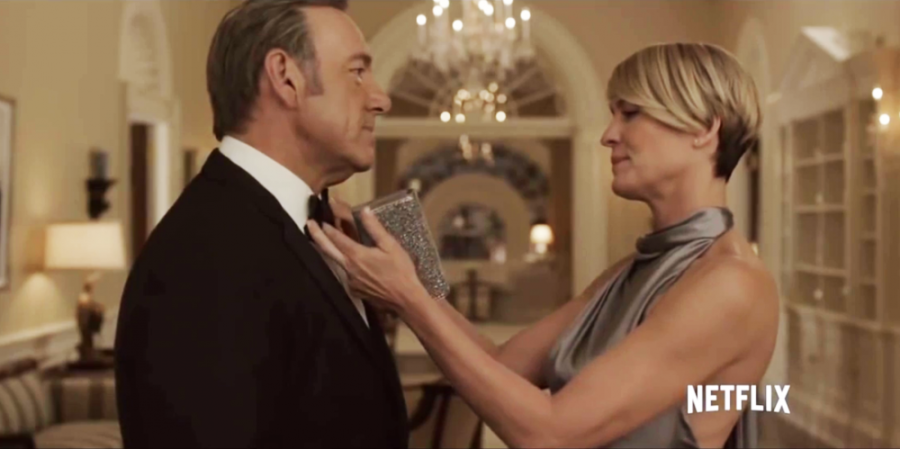If there’s one thing Frank Underwood is good at, it’s rationalizing the obscene into the palatable.
Or at least, that’s what Heather Dunbar (Elizabeth Marvel) tells him after she announces that she’ll be running against him for the presidency in season three of “House of Cards,” which still manages to bring a strong hand to the table and plays it as carefully as Frank would.
The season starts off with Frank’s (Kevin Spacey) ascension to the presidency thanks to the aid of his staff and, most importantly, his wife, Claire (Robin Wright). Starting in the middle of a term, though, means campaigning for re-election soon, and the Democratic leadership refuses to support him. Seemingly no one likes him. So, Frank makes a gamble and decides to falsely announce that he won’t be running, preferring to focus on America Works, his employment plan for the U.S.
America Works is an odd thing, and the way “House of Cards” presents it is even odder. Frank, a Democrat, declares to the public that they are entitled to nothing. “AmWorks” strips away social security, Medicare and Medicaid, using the savings to incentivize employers to hire. When Congress refuses, Frank funds it by seizing funds appropriated to FEMA — a rock-solid plan, unless, of course, a hurricane hits. (Hint: It does. Sort of.)
Here, “House of Cards” takes its first and only misstep. The show seems intent on equating its fictional Congress with America’s real one. Frank turns to the camera at one point and comments on how little Congress does, but while that may be true in reality, it rings hollow in the show — especially since real-life politicians have commented on how weirdly effective the show’s legislators are.
But Frank isn’t really the focal point of season three. Rather, everyone else is.
First, there’s Russian President Viktor Petrov (Lars Mikkelsen), a thinly veiled caricature of real-life President Vladimir Putin. Like Putin, Petrov even has shirtless photo-ops. Petty at times and as conniving as Frank, Mikkelsen’s performance is nothing short of amazing. His relationship with Frank gets sourer misstep after misstep, making him one of the better parts of the season.
Even more intriguing, however, is Doug Stamper (Michael Kelly). Stamper has survived his attack by Rachel Posner (Rachel Brosnahan) last season, but his obsession with her isn’t over. He has her tracked down and struggles with his alcoholism.
After the attack, Frank doesn’t seem to want Doug back, so Doug pretends to give information to Dunbar — only to funnel it back to Frank. It pays off in the end; Doug finds (and kills) Rachel and becomes Frank’s chief of staff once more.
The most important character in the show, however, is Claire Underwood. Claire seems to have been shuttled around in the past two seasons based on the plot’s whim, and at first, this seems true in the beginning of season three. She has Frank appoint her as ambassador to the U.N. because she wants to start her own career. It’s a strange step; she hasn’t mentioned wanting the position before and has practically no foreign policy experience — something which many characters point out.
Claire’s arc, though, redeems what seems like bad writing. “House of Cards” is Frank’s show; Claire is constantly overshadowed, and she can’t stand it. She tells Frank in a moment of anger that she should never have made him president, and the fact is, it’s true. He’s president because of her. Claire ends up with nothing, her ambitions have fallen by the wayside so Frank can sit in the Oval Office — which Claire reminds him only has one seat.
Frank treats his relationship with Claire like any other he has: He tells her that she’ll do what he wants and like it. It’s something he does with many characters over the season and show, and here, it finally falls apart. Claire leaves him, and so does Frank’s chief of staff.
Season three frequently makes references to former President Franklin Delano Roosevelt and his wife, Eleanor Roosevelt. Their relationship closely parallels the Underwoods’; Claire is as ambitious as Eleanor was and Frank as powerful as FDR, and both care strongly about their legacy. In one of the most poignant scenes of the season, Frank visits FDR’s memorial in Washington. There, he sees Eleanor’s statue standing alone, separated from FDR by a wall, and fears he and Claire will become just as separated.
It’s not presidential worries that ends up building that wall, however. It’s Frank himself.
Like any classic, “House of Cards” is about hubris, and Frank is soon going to pay the price for his — assuming there is a season four, which Netflix hasn’t yet announced.
One thing is clear: Frank’s political career is over, all because he stopped respecting the person who gave it to him.
Season three might not have been an Abraham Lincoln, but it’s certainly no William Henry Harrison, either. The writers have proven themselves more than capable of bringing forward the drama of past seasons. Frank wants people to line up to pay their respects to him; “House of Cards” might actually end up getting that. The show ends up being nothing short of an FDR — strong, powerful and visionary, though contentious and, perhaps, even power-hungry.
_______________
Follow Ashwin Mehra on Twitter.









